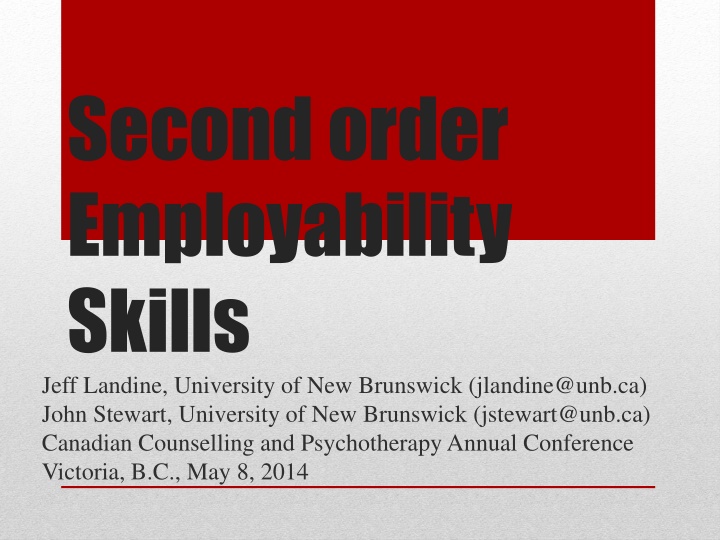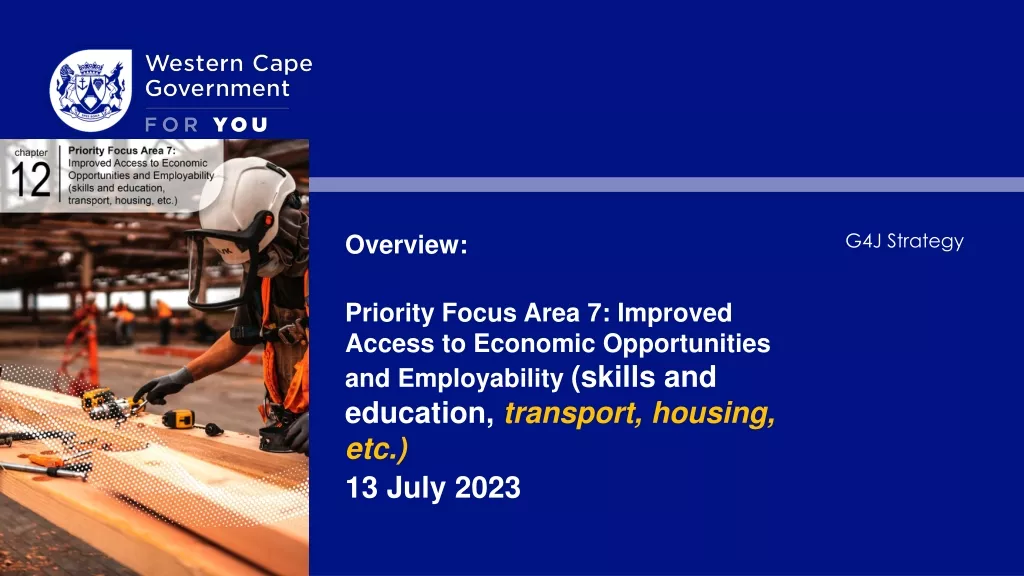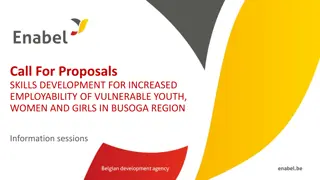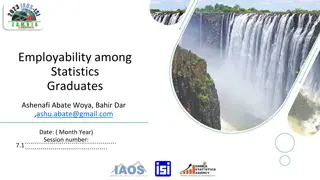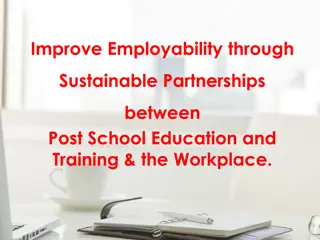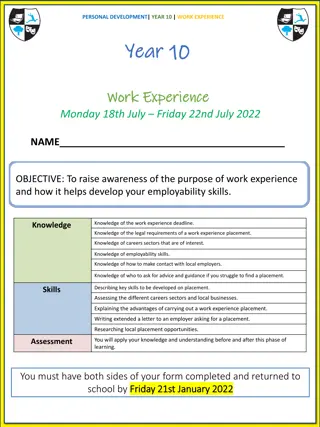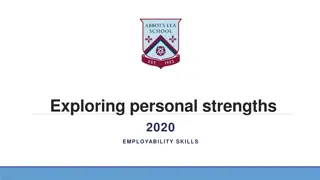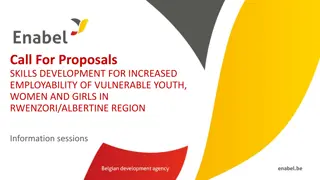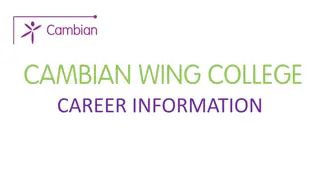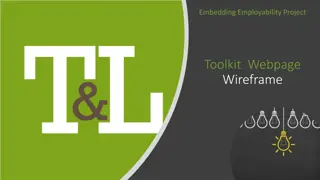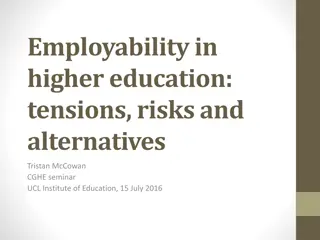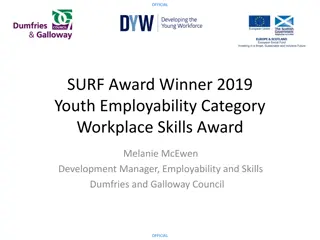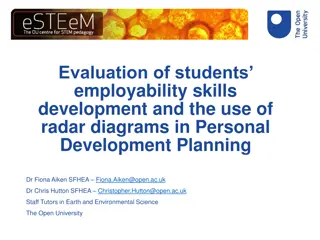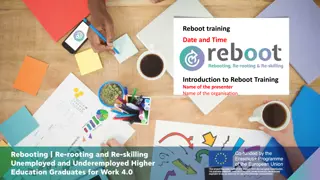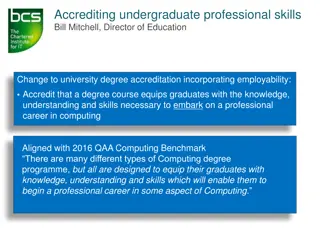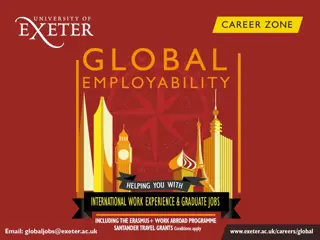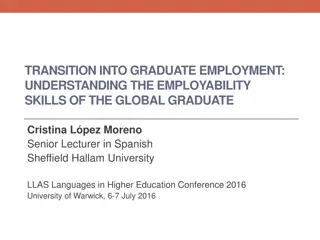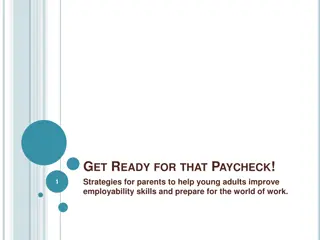Enhancing Employability Skills: A Comprehensive Approach
Explore the concept of employability skills beyond traditional definitions, analyzing deficiencies in current perspectives. Delve into case studies to identify necessary assets and growth areas for employability, and learn strategies to assist clients in enhancing their employability through a comprehensive model. Gain insights into psycho-social, person-centered constructs that help individuals adapt to work roles effectively.
Download Presentation

Please find below an Image/Link to download the presentation.
The content on the website is provided AS IS for your information and personal use only. It may not be sold, licensed, or shared on other websites without obtaining consent from the author.If you encounter any issues during the download, it is possible that the publisher has removed the file from their server.
You are allowed to download the files provided on this website for personal or commercial use, subject to the condition that they are used lawfully. All files are the property of their respective owners.
The content on the website is provided AS IS for your information and personal use only. It may not be sold, licensed, or shared on other websites without obtaining consent from the author.
E N D
Presentation Transcript
Second order Employability Skills Jeff Landine, University of New Brunswick (jlandine@unb.ca) John Stewart, University of New Brunswick (jstewart@unb.ca) Canadian Counselling and Psychotherapy Annual Conference Victoria, B.C., May 8, 2014
Comment on the deficiencies of only considering employability skills such as those suggested by the Conference Board of Canada. Analyze a case study for the assets and growth areas necessary for employability. Apply a comprehensive model to assess employability. Acquire some new perspectives and strategies for helping clients become more employable. Objectives
Employability skills are transferable core skill groups that represent essential functional and enabling knowledge, skills, and attitudes required by the 21st century workplace. They are necessary for career success at all levels of employment and for all levels of education (Overtoom, 2000). Employability Skills 2000. (Conference Board of Canada) 21stCentury Skills for Workplace Success (USA) Employability Skills (narrowly defined)
Psycho-social, multi-faceted, person-centered construct Help workers to adapt (acquire, fulfill and obtain) to work roles Adapting makes use of a number of competencies attitudes, knowledge and skills. These competencies exist on a number of hierarchical levels: knowledge of self, world of work; decision skills, technical skills, human-relation skills, personal qualities. Employability Skills (broadly defined)
See handout Case study
1. What personality tendencies can you assess that may influence this client's behavior? 2. What self-constructs can you identify that may influence this client's behavior? 3. What assets (both personal and environmental) does this client bring to the job search process? 4. What roles are evident or being established at this point in her development? Case Study Questions
Self- regulatory, psychosocial competencies Strategies and behaviors to achieve work goals Strengths/capacities that are used at the person-in- environment intersection Second-order generally indicates an extended or higher complexity. Components of Employability Career Adaptability Human and Social Capital Career Identity Employability
Personal Factors: Optimism hope concerning the career challenge and future Propensity to learn threats to jobs and opportunities elsewhere Openness embrace the learning, exploration Internal locus of control intentional decision-making Generalized self-efficacy perceptions/judgements about the ability to handle life-events Career Adaptability
Human personal resources Includes age, education, work experience, job performance, cognitive ability, etc. Education and experience best predictors Experience builds proficiency and tacit knowledge (portable skills) Investments: continuous learning and adaptive orientation Social social networks Provided information and influence to the job seeker Strong social networks contribute support and cooperation Span organizations and time Human and Social Capital
Cognitive schemas that merge together personality, knowledge, skills, aspirations, motivation, values, opportunities, etc. Coherent narratives that frame, give meaning to and provide continuity between past, present and future career experiences Requires external validation Is a self-regulative process Career identity
Employability Skills Career Adaptability Human and Social Capital Career Identity Concern Control Curiosity Confidence Human Social Self Schemas Optimism Desire to learn Openness Self-efficacy Vision Intuition Education Networks Self-efficacy Experience Locus of Control Self-esteem Roles Self-confidence Motivation Internal Locus of Control Planning Skills Time manage- ment skills Thinking strategies Ability to monitor the process Information Gathering Strategies Employability Skills
Developing client readiness cope with change Focus clients to look ahead and around Assess: planfulness, exploration of self and situation, decision-making skills Counselling for Adaptability
Career adaptability Focus on outcomes Willingness to change Competencies need to change Focus on work role Goals for Adaptability
Prepare the client for change (conditions for growth) Facilitate reflection on work roles Identify work and career motives Document the clients narrative of career identity to self and others Counsellingfor career identity
Receptive to feedback Confidence Safety Openness and interest to grow Acquiring a repertoire of career roles Negotiating work-family conflicts Goals for career identity
Organizational performance domain: Dominant personal motive: Exploitation - production, results Exploration - innovation, change Distinction - Autonomy/agency Self-assertion Maker Expert Integration - Connectedness, belonging, cooperation, sharing Presenter Guide Structure - Cohesion/meaning; institutional structure Director Inspirator The career roles model: six classes of career roles.
Personal Management Skills demonstrate positive attitudes and behaviours confidence; feels good about self; integrity; show interest, initiative, and effort be responsible accountable be adaptable open to change; learn from mistakes; accept feedback Learn continuously curiosity Work safely Employability Skills 2000+
Fundamental Skills communicate appreciates the POV of others manage information use numbers think and solve problems Employability Skills 2000+
Teamwork Skills work with others participate in projects and tasks understand roles; lead or support Employability Skills 2000+
